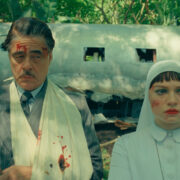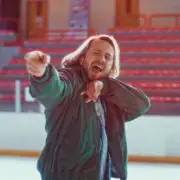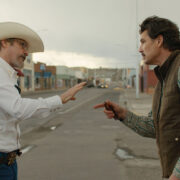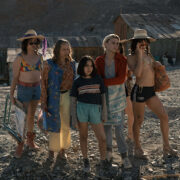Interview With Co-Writer & Director Of COLETTE, Wash Westmoreland
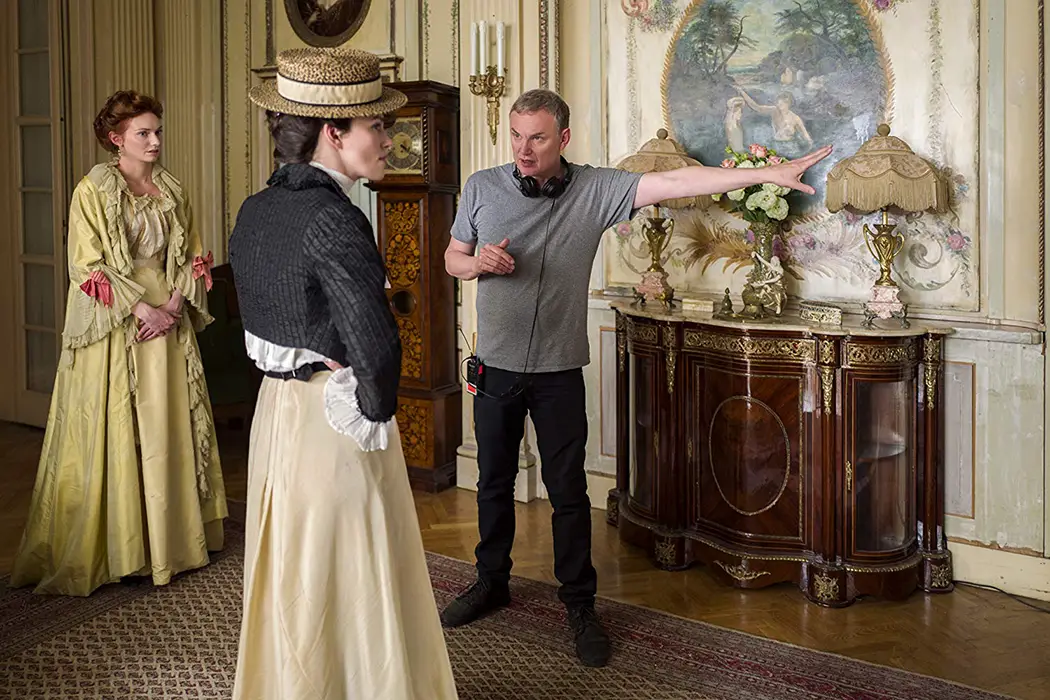
Kristy Strouse is the Owner/Editor in Chief of Film Inquiry,…
I was able to talk with writer/director Wash Westmoreland, whose previous films include the heartbreaking, but stunning, Still, Alice. With his newest, Colette, we are able to delve into the real-life story of the French novelist. It covers many years of her life (played by Keira Knightley), primarily her marriage to Willy (Dominic West), who had a large presence as a known author. During their marriage she pens the Claudine novels, though they are published under Willy’s name.
Colette is about the struggle for her voice to be heard, and the battle she faces to claim her rightful work. It also touches on her relationship with gender-defying Missy, Mathilde de Morny (Denise Gough, read our interview with her here). It’s a beautifully shot period piece that echoes sentiments for modern women everywhere.
I was able to talk to Westmoreland, and we discussed the journey it was from script to screen, how inspiring these real-life people were, the casting process, and much more!
Kristy Strouse for Film Inquiry: Congratulations on the film, I really enjoyed it. I know you co-wrote the script with your partner Richard Glatzer and I wanted to say I’m sorry for your loss.
Wash Westmoreland: I really appreciate you saying that, thanks so much. Making this film has had a lot to do with processing our whole time together really, this was our dream project.
I imagine it was especially difficult since this was something you worked on together. What drew you to Colette’s story originally?
Wash Westmoreland: The original draw was Colette herself. She’s an incredibly interesting character, a brilliant writer, who made such extraordinary decisions in her own life. She did incredibly courageous things, she was a pioneer, writing about women’s sexual experiences and writing about exploring issues with her own sexuality. All of that really appealed. It was Richard really who first discovered her in our household and who was avidly reading Colette novels and biographies and saying look there’s a film here. And then I started reading also and we focused on the first marriage between her and Willy as this natural compelling narrative where you see the formation of an artist with a very slippery antagonist.
What was it like co-writing the screenplay? Because you also co-wrote it with Rebecca Lenkiewicz, as well as Richard.
Wash Westmoreland: With me and Richard it was very much about our whole day to day existence. We lived together, worked together, slept together and we very much enjoyed writing together. And were very gloves off; we were very honest with each other. We would work out all of our differences during the writing process so when we got to set to direct we would very much have a creative unity. And after Richard passed away I worked on my own for a while, and I was feeling the lack of him, very acutely.
Then our producers Elizabeth Karlsen and Pamela Koffler suggested “well, why don’t you try working with a new co-writer?” And that seemed almost like, out of the question [laughs] no! And then they said would you look at a list, and I said, oh okay then. Then they sent over a list, and at the top of the list was Rebecca. And I had just seen Ida the year before and I was so impressed by it. And so, I skyped with Rebecca and we just really hit it off. She’s a really fantastic, wonderful, amazing, warm, brilliant woman. We just clicked.
And she had read Colette when she was younger, and she had a lot of insights into Colette. And into her sort of, worldview and her sensuality. And she brought so much to Willy, had a lot of fun with him as well. Willy was the master of puns, so we both had a lot of fun finding witty, pompous things for him to say. She became a really great collaborator and we had a wonderful time working together. So, she really brought it into its final phase, ready for production with fully formed characters.
I did notice Willy had some funny lines. It’s interesting because he’s charismatic, but he’s also a villain. You couldn’t help but laugh at him.
Wash Westmoreland: Yeah and I think that’s really important to understand. He was a villain and the things he did were often despicable. He certainly exploited Colette and he was very much self-serving, and about his own ego, and in many ways, he was unbearable, but he got away with that because he had charm, he had wit and intellectual dexterity. He could take over the room with an anecdote, and if Willy arrived the party started. He was that kind of person which Dominic completely got in the way he interpreted Willy and so it made you understand with powerful men who behaved badly; often you could be in a room with them and they seemed very wonderful and charming, and on a surface level generous. Those are all qualities that kind of obfuscate the real underneath machinations of power.
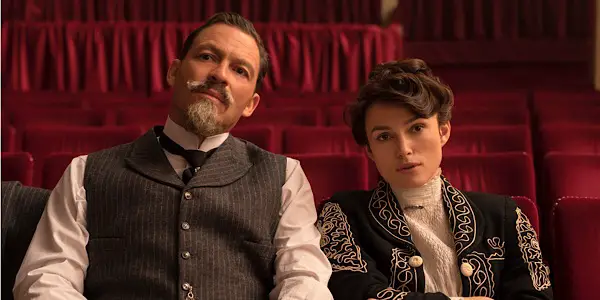
Yeah, and I was surprised at how little he did. It’s shown in the film, not even just with Collette but in general. It was like he was more of the face for things, but didn’t often do the work.
Wash Westmoreland: Yeah well he was someone who thrived on the adrenaline of ideas. So, he was like a pitchman, and he would get his buzz from the breaking ideas. So, he was always coming up for ideas for books. He was a music critic, he would review various operas and new classical works that were being debuted in Paris at the time. And, he had a very sort-of flowery literary stance, almost impenetrable to a modern reader [laughs].
But as far as the novel went he just didn’t kind of have the discipline. There was this fear of the blank page. This, kind of like, an inability to have the creative depth to bring what is needed to do a novel and that’s what Collette had in spades. He suggested she started writing so she always credits him as the reason she became a writer. It was under his discipline. Then he mentored her in a certain way although the direction he pushed some of the books was towards his own world view which was very much more the male gaze. You’ll see some of the passages in the Claudine’s, and you’ll go, “oh that was Willy’s input right there,” but he sort of does tell about his own personal impotency as he moved into middle age. It was something Collette wrote about was that he struggled with impotency in the bedroom and also as a writer, so all that gets wrapped up in the story and its really a tragic character.
He’s definitely an interesting character and the dynamic between him and Collette is very interesting, and Dominic and Keira have a great chemistry on screen.
Wash Westmoreland: As soon as I started reading the dialogue I was so happy that day. It was about four or five weeks before shooting and we were in a little room in Twickenham studios in London, and it just sprang to life because they were both so brilliant and quick and witty. And they played sort of intellectual tennis with the lines, flicking it back and forth, and I thought this works so well because my plan was to do a lot of long takes in which rather than cutting a lot between them you really got to live in real time moments with them as they have conversations because they both had exceptional minds and kept each other entertained. This was obviously before internet, TV, film anything, they used personalities to switch each other on and the value of wit was very high in society and they waxed their wits with each other.
Did you have Keira in mind?
Wash Westmoreland: Well when the script was written in 2001 Keira would have been 14 [Laughs]. So, she wasn’t immediately on the radar. When the project got its final push it was after Still Alice, and around that time Keira jumped forward as being the perfect person because she has such a personal electricity, a strong sense of self, and a kind of effortless charisma. There were so many things about her that worked so well because she’s such an incredible actress. The part also offered new challenges that we hadn’t seen Keira do before, I’d never seen Keira be such a sexual explorer before on screen and she was very much up for it when she took on this role.
She was wonderful, and she appeared very confident and Collette as a real-life person seemed like she was. She had a real presence.
Wash Westmoreland: Oh yes, absolutely.
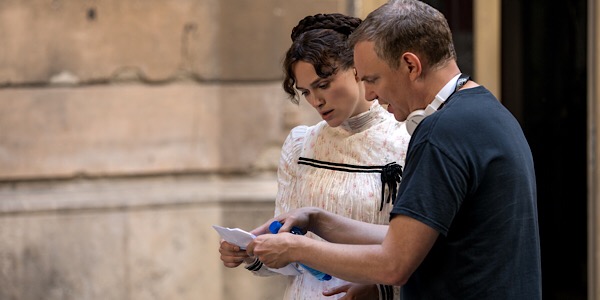
It is interesting because it’s a period film, but it also has a modern feel. Especially with the #MeToo and #TimesUp movement and women finally finding their voice, it is something women has always faced but now things are changing. You said you wrote the screenplay in 2001, was the timing, as far as getting the film made, did that have anything to do with it, was it easier in anyway?
Wash Westmoreland: When we wrote the screenplay, we wrote in ten days and we were like “Ok this is great, Let’s go!” [Laughs] and we didn’t realize it would take so long and we made three other films while we were waiting to make Collette and sometimes we thought “Will we ever get to make this movie?” We both thought it was so good, but we had to wait for a point in our careers when we could springboard into something of this level, budget-wise. And that was the first thing, but the second thing was yeah, I think sometimes the zeitgeist propel films forward.
There are so many films coming out this year about strong women, and about women taking on adversity and battling challenges that are part of the structure of male society. And those didn’t all get greenlight after #metoo, they have been in the pipeline for years as well. I feel like there’s something about #timesup and #metoo, and it happened so quickly because the pressure for change was building to such a high level before that. And I think the story of Colette and Willy is happening a thousand times a day in America and all over the world that men are taking credit for them and so many times with friends I’d say “has that happened to you?” and they’d say “f*ck yeah.” “I’d be in a meeting and no one will really take note of it, and then five minutes later my male boss will say the same thing, and everyone will go ‘oh that’s it!” [Laughs]
Ya know, it’s sort of like, that’s the way things are set up. That’s something that Colette challenges, and something that #timesup is challenging.
Definitely and Colette was really an innovator as well as Missy.
Wash Westmoreland: Oh absolutely, and I think Colette took inspiration from Missy. Because Missy was going so far out there to express her authentic self and dressing in suits and trousers when that was illegal in Paris, you could actually be arrested for that. Missy actually had this special skirt made that would go over her trousers, so when she was walking on the street she could go incognito and then when she came into a social space where people accepted who she was, she could whip up the skirt and have trousers on underneath. So, that was a really interesting moment in time.
In the movie she says, because it’s a lot easier for her than for women of lower standing, so she understood that her privilege kind of gave her this access to express who she was. She wanted that to be something that all women eventually do, if they wished. So, I see Missy as a pioneer, both of lesbian identity, though the word lesbian wasn’t really used at that time, Missy would have been referred to more commonly as an invert, not a very pleasant term but that was what was around at the time. I also think she is someone who is definitely a forerunner of the transgender community, that she really adopted masculinity, and felt comfortable walking around with a male attitude and persona.
Absolutely, and Denise was wonderful in the role. Was it difficult to cast Missy?
Wash Westmoreland: It was difficult to cast Missy, and it took a long time. And we had a very open and inclusive audition process and auditioned many different actors. Denise was the one who completely, immediately defined who Missy was. Both in terms of her class background, and her non-conformity, and her adoption of masculinity.
And, the sets, costumes and locale are all perfect. You feel fully immersed in French culture. Can you talk a bit about picking locations, and making sure details were right?
Wash Westmoreland: Well, I would have loved to have filmed the whole movie in France. That wasn’t possible from a budgetary standpoint and also, I think in the end we had a shoot that happened in three different countries. We shot the countryside in the UK, where we managed to find some 19th century houses, that we could convert into a more French looking with shutters and various devices that production designers have, so that was the first part.
The second part we went to Budapest and there’s actually a sort of stylistic connection between Budapest and Paris because Budapest remade itself as a city at the end of the nineteenth century and adopted a lot of Parisian style. In doing that they have their own Champs-Élysées which is called Andrassy, which is a big boulevard in the center of the city. And they have also their own Moulin Rouge, which was built to sort of copy the Moulin Rouge in Paris, but now it looks more like the original Moulin Rouge then the one in Paris does. Because the one in Paris has expanded and become a much bigger space.
So, there’s many things about Budapest that really lent themselves. All the interiors really we found had this sort of unrefurbished look to them, like it was the same windows, the same doorknobs, and floorboards, it just felt like time had not changed this place. It was a lot of great locations, which our production designer could then bring up to a Parisian look, and we had a truckload of furniture that came down from Paris. It was a lot of observing the style from a lot of graphic record and the paintings of the time of so many great artists to reference and find the look of Paris for that era. And then the last day of the shoot we did have one day in Paris, to get the really wide shots of Colette walking by the Saint, because where else are you going to get that, ya know? Hopefully it all matches together and creates what we wanted to convey to be with the times.
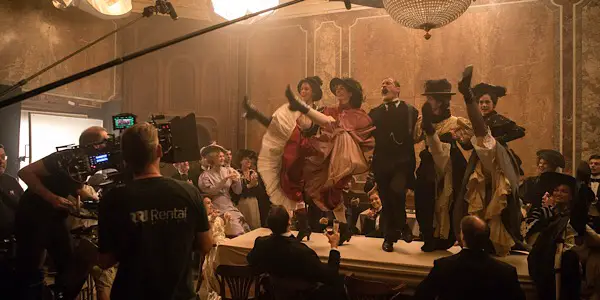
It does! I wouldn’t have known that you filmed in the UK and Budapest if you hadn’t told me, so great job.
Wash Westmoreland: We were very careful, and even our French friends who saw it were like “Oh you shot in Paris,” and I was like, “No.” [Laughs] We were very influenced by the films of Max Ophüls, who was a German filmmaker who worked in France in the 1930 and 1940s. Who was always recreating this very lovingly look in his films. Particularly Earrings of Madame De and Letter from an Unknown Woman were very influential in the way Colette looks.
Can you tell us about your next project, Earthquake Bird?
Wash Westmoreland: Yeah! Well, I just completed production on Earthquake Bird which shot in Tokyo, which shot between May and July of this year. It’s a very different film from Colette. It’s a female-centric crime story, a Tokyo-noir I call it. Starring Alicia Vikander.
Did you have any film inspirations growing up?
Wash Westmoreland: Yes I did, I was sort of looking at my father, who was best with cinema. And he would show us films and explain “this is a wide-shot, this is a dolly shot, this is a close up.” He would sort of explain films to me and my brother growing up. The exposure to film in Britain in the 70’s was essentially a lot of homegrown British productions. We’d get a lot of Carry On films, and James Bond films, and House of Horror, but I also saw a lot of Michael Powell films, who was an absolute visionary filmmaker. The work he did with Emeric Pressburger like Black Narcissus and those films, and the style completely mesmerized me in my formative years.
We want to thank Wash Westmoreland for taking the time to speak with us.
Colette has a US release September 21st, and a UK release on January 25th, 2019.
Does content like this matter to you?
Become a Member and support film journalism. Unlock access to all of Film Inquiry`s great articles. Join a community of like-minded readers who are passionate about cinema - get access to our private members Network, give back to independent filmmakers, and more.
Kristy Strouse is the Owner/Editor in Chief of Film Inquiry, writer, podcaster, and all around film and TV fanatic. She's also Head of Acquisitions at Tricoast Worldwide and is a member of The Online Association of Female Film Critics and The Hollywood Creative Alliance. She also has a horror website: Wonderfully Weird & Horrifying.










